#he's NOT the central character of the story and never will be
Text
As I’m sure you know, Hazbin Hotel’s central character is the princess of Hell, Charlie Morningstar. A lot of people have said a lot of things about her, but I’m here to touch on a subject that doesn’t get brought up much: her title.
Part 1: What does “Princess of Hell” really mean?
When most people think of princesses, they tend to imagine Disney ones. Fancy dresses, animal sidekicks, singing a lot, all that jazz. Charlie tends to engage in musical numbers, and she does have a few marketable pets, but her wardrobe is severely lacking. Clothes are an excellent way to signify a character’s job and status. If you put a character in a big sparkly dress, everybody looking at them will go “yep, that’s a princess.” So far, Charlie’s never worn one of those. Her main outfit is the suit-bow tie combo that Medrano just loves, making her feel like every other demon in the crowd.
Okay, maybe Earth and Hell are different in this regard. (Heh, that’d be a first.) Maybe high-status demons don’t wear fancy clothes! Except we’re forgetting one detail: the Goetias. They also use titles like “prince” and stuff, and they’re always dressed to impress! The one exception to this is Octavia, but that’s most likely because of her teenage angst, a trait Charlie doesn’t share.
While we’re talking about the Goetias, there’s another thing worth bringing up. As previously stated, they tend to use royal titles. Stolas is a prince, and he’s supposedly one of the less important ones! Stella’s a royal of some flavor, and that might not have even been through marriage! Compounding on this, the Deadly Sins are all stated to be the king/queen of their respective sin! Or have we forgotten Miss Queen Bee’s antics? With all these royals running around kissing and/or shooting each other, Charlie is once again lost in a crowd of standard Tumblrized monsters.
So maybe her royal title isn’t the important part. Maybe what really matters is that she’s Lucifer’s kid. Makes sense, right? Well, no. The purpose of an heir is to take control of their parental figure’s assets (Hell, in our case) after said parental figure kicks the bucket. This doesn’t work here, since Lucifer’s immortal! He sure ain’t goin’ anywhere! Historically, princesses were mostly just used as bargaining chips to marry off to other kingdoms in exchange for stuff. That really doesn’t work here, because in this show there are no other kingdoms! You really think the ruling powers in Heaven are gonna want their kids marrying some demon?
So now that we’ve established that the title ‘Princess of Hell’ is virtually meaningless, we reach my second point: why even have it?
Part 2: Why even have it?
As any good English teacher will tell you, everything within a story was done for a reason. Yet, Charlie being a princess serves no narrative purpose. She never uses her title to get what she wants, and everyone around her treats her exactly the same way they’d treat any other demon. You could say it was to introduce Lucifer more organically into the story, but there’s other ways to do that.
One of the many, many aspects of storytelling that Medrano struggles with is the act of killing your darlings. What that means is, if something in your story isn’t doing much and thus has no reason to exist, get rid of it, no matter how much you like it. Viv’s inability to do this is the reason everything she writes has so damn many characters, and by extension why almost none of them are remotely interesting. A character being the Devil’s daughter sounds interesting, but if the writers can’t make it interesting, they shouldn’t do it.
So, why did Viv make Charlie a princess? Here’s my theory; writers want their main characters to be relatable to general audiences, and Viv must’ve forgotten that general audiences aren’t composed of upper-class white women whose every need and want is supplied by their affluent parents. To the rest of us, such a character risks invoking that very worst of writing tropes. I won’t type it right here, but it has seven letters and sounds like hairy stew.
#anti vivziepop#hazbin hotel critical#anti hazbin hotel#hazbin hotel criticism#anti charlie morningstar
32 notes
·
View notes
Note
So, what is your take on the human fighters relevancy in the latter half of the story? I’m mainly speaking of Krillin, Tenshinhan and Yamcha - in my experience, most are largely fine with Chaozu fading into the background (he was always more of an accessory to Tenshinhan, in the same way Puar is to Yamcha), but I’m curious if you think the three main earthling fighters still had potential and/or unfinished business narratively speaking?
Additionally, do you believe Dragonball should ultimately always be “The Goku Show” or rather be produced as somewhat of an ensemble?
It depends on the story being told. Dragon Ball was created as the story of Son Goku's pursuit of self-improvement and personal growth. It's an individualist story about a protagonist pushing himself to new horizons and developing himself both as a martial artist and as a person. With that in mind, it makes sense to keep the story centered on Goku.
A good story should be about what it's about. It should focus on the things that are important for conveying its central ideas and philosophies.
I don't think there was any unfinished business for Krillin, Yamcha, or Ten. Krillin and Yamcha never had a big arc to begin with; They were supporting characters whose main role was to flesh out the cast. Tenshinhan did have an arc, but it concluded at the 23rd Tenkaichi Budokai when he faced down Taopaipai, his former role model and the embodiment of his past, in the tournament arena.
None of these characters had anything they had to do, going untold. That's exactly what made it so easy for them to fall into the background and be replaced by characters who did still have stories to tell. Notably, Piccolo also slides out of focus following the Cell arc, after his story concludes with his reunification with God. Like Yamcha, Ten, and Krillin before him, Piccolo had nothing left to tell and so he became a warm body filling space in other people's stories.
This, I think, is preferable to characters continuing to hang around and try to stay in focus long after they've run out of anything to actually do. This is the main problem afflicting Goku and Vegeta in Dragon Ball Super, whose stories already reached satisfactory conclusions during the Cell Games and Majin Buu arc respectively. Neither Goku nor Vegeta have stories left to tell, but Super keeps them in focus and keeps trying to wring blood out of a stone.
Other shonens are able to get more mileage out of their supporting casts because they're exploring different ideas and different themes. They're written with the idea that these characters will be a team surrounding the protagonist in mind, while the cast of Dragon Ball are written to be rivals for Goku to overcome in his journey of self-improvement.
Again, neither of these approaches are wrong. There is no universally correct way to tell a story.
I've said it before but if you want to know what cost the humans their time in the sun, blame the death of the Tenkaichi Budokai. These tournament arcs were a great opportunity for characters not directly involved with the ultimate conflict to strut their stuff, contribute narratively, and get spotlight time to look cool - whether they win or lose a given match.
With that in mind, if I could change anything about Dragon Ball's approach to these characters, it would be to put a new Tenkaichi Budokai between Namek and the Android arc. This would give Yamcha, Tenshinhan, and Chiaotzu opportunities to demonstrate the new skills they've cultivated during their training with Kaio, and to help rebalance the power-scale between the characters who went to Namek and the ones who missed out.
22 notes
·
View notes
Text
Ever since the Kenobi show came out the entire SW fandom now seems to think Obi-Wan Kenobi is the main character of Star Wars. Not Anakin, not the Skywalkers. Obi-Wan. Just because Disney made a big-budget fanfic about him. 🤦🏽♀️
#don’t know if I should laugh or cry 😅😭#and no... I'm not saying other characters shouldn't receive attention#in fact...under different circumstances i would not mind at all#but within the context of Disney's terrible and destructive 'sequels'#(which had a decidedly 'anti-Skywalker' bias!!!)#i will always be inherently suspicious of the way Disney portray ANY other SW characters#because Disney NEVER truly acknowledged Anakin Skywalker as the CENTRAL FIGURE OF THE LUCAS SAGA#in fact they tried to pretend he wasn't 'that important'... tried to destroy the ENTIRE meaning of his story#and reduce him to nothing but 'Vader'#so why would I welcome yet another entry into this same madness??#i'm not even getting into detail about my views on Obi-Wan's character here#only to say that I love him dearly#but i love the tragically flawed Lucas CANON version of him#not the 'long suffering saint' idealised fanon version i'm seeing everywhere these days#and the fact is -- no matter how much people like him#he's NOT the central character of the story and never will be#there's a reason it's called the SKYWALKER saga... ffs#anti-disney#or perhaps more accurately#anti-disney sw fandom
10 notes
·
View notes
Text

they literally had no clue what a special and one-of-a-kind character they had on their hands
leagues above the rest of this show’s characters in terms of emotional depth
#not to sound like a broken record but the fact that the writers treated him like shit adds a layer to his narrative#like if he wasn’t saddled with his particular role within the restrictions of his particular universe I wonder whether he would’ve spoken#to as many sad freaks like me as he did#if he wasn’t written thru a misogynistic lens for a misogynistic audience his story may have been significantly less tragic#if he wasn’t in a story that viewed mental illness and addiction as moral failures.#if he wasn’t in a story that ultimately believed in Us vs Them and in the inherent Rightness of the nuclear family#if he wasn’t in a story that handwaved and made excuses for the abuse he suffered at the hands of his loved ones bc it was#merely a consequence of him straying from the Mission#thee singular male character that I’ll tell you is a woman and mean it in the sense that you CANNOT engage meaningfully with him without#acknowledging that his central conflicts and his defining traits and the way the fandom at large treats him are all tied up in#traditional expectations for female characters#he’s relatable if you’re a misunderstood woman and if you’re queer and if you’re a 2nd gen american#if you’ve felt lonely your whole life and if you feel like you never fit anywhere#an actually perfect character to me few others can compare#tag vomit
13 notes
·
View notes
Text
I never did mention, but I finally beat Vesperia! It was okay--a more than solid rpg, but not one of my personal faves from the series. The plot was pretty standard for a Tales game--maybe slightly more deus ex machina-y in the final act, though I may just be forgetting the most egregious things from some of the other titles. Rita stands out as my single favorite character (to no one's surprise) and honestly probably one of my faves overall for the series. Judith was also pretty fun, and I liked Raven's story arc even if it felt a little clumsy or confusing at times. And obviously the Yuri-Flynn dynamic/relationship/tension pretty much carries the entire game.
Speaking of which, I've already devoured a week's worth of Fluri fanfiction (impeccable ship portmanteau, btw) and have a whole stack of longfics still waiting in my Marked for Laters. They're so stupid and noble and good for each other, I love them a lot. I'll have to rec some of these later if I think about it.
(I also found out yesterday that there's a heckign FEATURE-LENGTH MOVIE about the two of them as knights-in-training, which!!!!!!!! guess what I'm watching tonight)
Anyway. Glad I finally played it! Not sure it quite lived up to my expectations, but then again I think Arise simply raised my standards to an absurd level lol, so it's not entirely Vesperia's fault. It also would've helped if I'd been any good at using Yuri in combat, but alas,
#Tyto plays ToV#I wanted to REALLY love Yuri as a protagonist and like. I DO like him. he's a good and interesting character#but I never felt like they QUITE scratched some of the itches I was hoping they were going to??#I don't even know how to explain it really#it's just. idk. they established him as this antihero vigilante archetype. and then had Flynn as his foil.#and then had the Empire vs Guilds conflict going on sort of in parallel to that#but not REALLY bc both Yuri and Flynn are too idealistic to let any blind nationalism get in the way of what they think is right/just#and............. idk like they DO explore a lot of nuance within that dynamic but I was left wanting MORE still#and maybe the ultimate threat being mostly unrelated to the war was part of the problem?#like. they were just cramming too many ideas on top of each other for this one.#the villain is War but also.... Climate Change? a little bit? lmao that's oversimplifying obviously but#if you've played it you know what I mean#the answer to Both problems is humanity overcoming differences and choosing to work together even when it's inconvenient#which is an AWESOME central theme for a story and I really dig it. but like I said it felt kinda disjointed at some parts#(disclaimer I'm sure if I'd written out my thoughts like this for the other Tales games I'd have just as many things to nitpick ahfdjshf)#(it was still really good!!! I had fun I liked it this series rocks I'm gonna shut up now lol)
1 note
·
View note
Text
i think every piece of media needs a character haunting the narrative. just a little
#its awesome when its overt and central#but also this can be way more subtle. like i was thinking who could fill this role in splatoon#its the professor. we never see him and barely know anything about him but hes linked to so many different chsracters and events#its a very minor haunting. but there nonetheless. i think all media needs something like that#anyways i think in omori (which is what started me thinking about this) mari is the most obvious#but i think basil kind of does a little too in headspace where like the entire time he isnt there but hes very much a focus hes the goal#anyways i love you characters whose absence has a grip on the entire story#serena.txt
4 notes
·
View notes
Note
I do remember you talking a while ago about how you saw Harry in Tom, about him wanting it all - the career (the roles, the arenas) and his partner. I suspect what he personally takes from the story is very specific in the way it always is when we identify w art. But if that's part of it, I'm not sure he's also pondering the risks that you seem to be alluding to - he seems very sure of his future ("when I have kids...") - or if it's a fear at the back of his head, regardless.
Anon 2: Can you share me? Is so fascinating. Because it is a choice. And I wonder endlessly what it is like to be involved with Harry Styles and all his desires. And where does Louis and his desires fit? I wonder if they can. It makes me sad. I hope they figure it out for themselves. Louis seems happier than he has ever been and has some traction in his career. I’m very excited about his future. I think Harry is on a tight rope with his career and his relationship. I wonder if they can coexist.
********
So I was coming from a slightly different angle, when I compared Harry to Tom. I was thinking about Harry wanting everything in his public life. He's wearing a Dorothy outfit while selling out Madison Square Garden. He wants to engage with queer culture and keep his entire fantasy boyfriend audience.
When I read that section, and when I've written about it since, I wasn't imagine Harry saying that to Louis, but more metaphorically to the various people he wants to be. The dangers I was alluding to have nothing to do with having kids (which Harry has huge amounts of freedom about), and more about the tensions that are going to arise with his career.
I've had anons before that have made those suggestions, and obviously people are going to read the text (and Harry) in different ways. I don't think we can know what the tension points are for how Louis and Harry navigate their relationship (if they're in one). Right now I imagine they're actually the quite mundane problems that every relationship that involves 1, let alone 2, touring musicians have to face. Obviously questions about the intersections of their careers and what is and isn't possible will have to be discussed. But I'm not going to assume I know what's going on there.
#Anon 1#I think there are other resonances I see for Harry#in this#it's a story where two people are telling stories about the central character#and we never get his point of view#and by adapting it#and making a film#Harry will be taking control of the central character#and making him solid seperate from the storiespeople tell about him#it fascinates me that he wants to do that
3 notes
·
View notes
Text
Goncharov wouldn’t be half as entertaining if Tumblr weren’t completely and utterly willing to “yes and” all the initial flaws. Katya’s name should be Goncharova? Her calling herself Goncharov reflects her complicated relationship with both her gender and her queerness. Andrey’s name should be Andrei? No, because he’s actually a Ukrainian being mistaken for a Russian by the Italians, which is central to his character and the themes about identity and nationality in the wake of the collapsed USSR. The USSR wouldn’t even fall until 20 years after the film was made? Matteo JWHJ0715 was ahead of his time.
It’s a great example about how good faith approach to writing can really enhance the reading, when you treat flaws as opportunities rather than just nitpicking them or erasing them. The mistakes being folded into Goncharov makes for a deeper, stronger, and more interesting story than if those mistakes had never happened at all.
28K notes
·
View notes
Text
Neil talking about the responses to Good Omens Season 2 - from the Neil Gaiman interview with Brian Levine for The Gould Standard (x,x)
BL: The audience that you have built is a very passionately engaged audience. They, frankly, they love you. And one of the reasons they love you is that you fit into what I think of as one of two great divisions in art. There's, or in writing, um, there is: I'm entertained, I'm amused. I may be even enchanted; and then there's this hits me at a visceral level. You understand me as no one else does. You have touched something very central to my experience. And it seems to me that Much of your writing, maybe all of your writing, actually reaches your audience at that latter level. You know. I would say in the former category, sort of my quintessential and beloved example would be P. G. Woodhouse. He amuses me, but I don't feel like he's revealed my inner self at a very deep level. Um, were you aware that you were going to be able to achieve that? Um, that this is something... was it a startling thing when people began coming up to you, who'd read your work and said, this means so much to me?
Neil: Yeah. It was huge. And it wasn't expected. I... if I had a mountaintop I was heading towards, it was gonna be P. G. Woodhouse. Um, I wanted to be a proficient entertainer with a clear prose style who could tell stories. Um, it probably wasn't until Sandman that I found... I started to realize that in order for a story to work, I had to show too much. In order for a story to resonate, in order for a story to matter, I had to let it matter too much. And, and I remember the first people who would start coming up to me and saying, um, you, you know, your, your Sandman comics got me through the death of a loved one. Your death character got me through my child's death, through my parent's death, through my partner's death, through my friend's death. Um, and that left me kind of amazed. I'm like, well, I didn't write it to do that. I wrote it to feed my children. I wrote it to satisfy myself. I wrote it because nobody else had ever written it. And if I didn't write it, it wouldn't be written, but I don't think I wrote it to give you what you've taken from it. And I spent really about 20, 25 years feeling awkward about that. And then my father died, in March 2009, and never got to cry about it. Never... I, you know, I've, I've got on a plane and I went to the UK and dealt with the funeral stuff and organized all of that stuff and came back and go toff the plane and went and did Stephen Colbert's Colbert Report and wearing the funeral suit because and that was all I had with me and carried on. And then, somewhere in the middle of summer, I was reading a friend's script. They'd sent me a script and said, can you look this over? And I'm reading it, and on page 20, the lead character meets somebody, and on page 26 maybe, she's dead, and I burst into tears. And I'm bawling. I am sobbing. It is coming out of me in giant racking waves. And I realized that it's everything that I'd been, hadn't let myself feel, or hadn't been able, hadn't stopped enough to let myself feel, was suddenly being given permission to feel by the death of a fictional person who I'd met six pages earlier, ia script. And I thought that... and it was huge for me, and I thought, okay, that's that thing that people are talking about sometimes, when they come tome and they say, you, you did this. So right now, I'm in this weird, wonderful place where I think a lot of people in Good Omens Season 2 thought they were signing up for the P.G. Woodhouse, and didn't know that, no, no, no, you've, you've signed up for the whole thing. You've signed up for the feelings. You've signed up for the emotions. I... it is my job to make you care and to make you feel and to feel things you haven't felt before. And which meant that the first week or so after Good Omens came out, I was getting angry, furious, deeply upset messages on every possible social medium telling me that I had betrayed people, and it was awful, and they couldn't stop crying, and why would I do that to them, and did I hate them? And they hated me. And then a weird sort of phenomenon happened as people would watch the show again. And again. And now they started to know, okay, this is where it's gonna go, this is what's gonna happen, this is how it works. And they started realizing that they were actually feeling things, and that was good. And that they were caring about two people who don't exist. You know, I made them up, and then and Terry Pratchett made them up, and then, um, David Tennant and Michael Sheen gave them life, and then they get to walk around on a screen and you know they don't exist, but you can cry for them, you can love them, they can make you laugh, they can make you exult, and most important of all, they can make you care. And the number of people who are now writing to me, saying, 'This was so important to me. This has changed my life. This makes me feel like I belong. This makes me feel like I can cope. And it's let me sort of find myself. P. S. I hope you get to do Season Three.' is, is huge.
#good omens#neil gaiman#brian levine#neil the gould standard 2023#interview#neil interview#videos#fun fact#gos2#season 2#2ep6#s2 interview
735 notes
·
View notes
Text

Are You Satisfied?
As you might have heard chapter 236 of Jujutsu Kaisen ends with the death of Gojo Satoru. The fandom is making a pretty big deal about it. As someone who predicted from the beginning that Gojo was going to lose against Sukuna, the reaction is fascinating to me. This is perhaps the most controversial chapter of Jujutsu Kaisen I've ever seen. So I've decided to throw my hat into the ring.
The central theme of Jujutsu Kaisen is death, so the death of one of the main characters isn't too surprising, but what does Gojo's death mean for the story? What does it say about his character?
As I said above I am a little bit shocked by the extreme controversy over Gojo's death. Gojo was never going to win the fight in the first place, because Jujutsu Kaisen is a story and the story would be over if he defeated Sukuna. He'd easily be able to take care of Kenjaku afterwards and the main conflcit would be resolved. Would it really be an interesting story if Gojo one shotted the villains while the kids just wathced on Television?
The story is also not about Gojo, it's about the students. Gojo may think he's the protagonist of reality but he's not the protagonist of the story.
Once again, Jujutsu Kaisen is a story and stories have themes. We may grow personally attached to characters, but characters are just narrative tools to convey the themes of a story, no different from prose, dialogue, and art. Characters are a tool to be used well or used poorly, and sometimes yes that means killing them. Whether Gojo's death was naratively satisfying though isn't the purpose of this post though we're only asking what does it mean?
Finally, Jujutsu Kaisen is not only a fictional story, it's specifically a tragedy. Full disclosure, it's a manga about death.
The Protagonist of a Tragedy
So, number one shout out to me for making this post 4 months ago where I called the way Gojo would end the fight.


Excuse me while I fist pump for calling it!
The question on everyone's minds is why does one of the most powerful characters in the manga die offscreen in a pretty humiliating way, cut in half and helpless on the ground just like Kaneki. The reason Gojo didn't get a more heroic (or cooler) death is because we're not reading My Hero Academia, this is not a story about heroes or even a typical Shonen manga it is a tragedy.
In poetics Aristotle defines tragedy as:
"an imitation of an action that is serious, complete, and of a certain magnitude; in language embellished with each kind of artistic ornament, the several kinds being found in separate parts of the play; in the form of action, not of narrative; through pity and fear effecting the proper purgation of these emotions" (51).
To paraphrase a tragedy is about human action, actions characters make in a tragedy often have dire consequences. One of the most common consequences if the reversal of a hero's fortune, a hero of a tragedy usually starts out on top and ends up on the bottom because of the bad choices they make. If in normal shonen manga characters overcome their flaws through effort and persistence, in Jujutsu Kaisen we see characters more often than not lose to their flaws.
The reason I posted that Kaneki panel specifically is because it was a brilliant moment of narrative punishment for Kaneki's central character flaw. Kaneki the hero's main flaw is that he always fights alone, and he constantly makes that same choice over and over again to fight alone. One of the characters helpfully explains it as well.

Stories are primarily about change. If a character doesn't change they're not serving the plot, unless that specifically is the point. People have pointed out how abrupt it is for Gojo to get sealed in Shibuya, get let out, and then immediately die afterwards but that's kind of the point. Gojo made more or less the exact same choice (he asked for Utahime's help for a buff but otherwise fought the entire battle himself). The definition of insanity and what not, why would doing the same thing over and over again net him a different result?

Not only did Gojo choose to fight alone, but as I've been hammering on and on about in previous meta the entire fight Gojo cared more about fighting a strong opponent then he did saving Megumi, the child he was responsible for.
Jujutsu Kaisen is not a typical shonen manga where everything is resolved by beating a strong villain in a fight. That's specifically why I used the Tokyo Ghoul reference, because the reason Kaneki is defeated offscreen like that is because he thought the world worked like a shonen manga. He has a fantasy sequence where he's fighting Juzo in a shonen battle tournament like this is Yu Yu Hakusho right before it snaps back to reality and he's limbless on the ground.
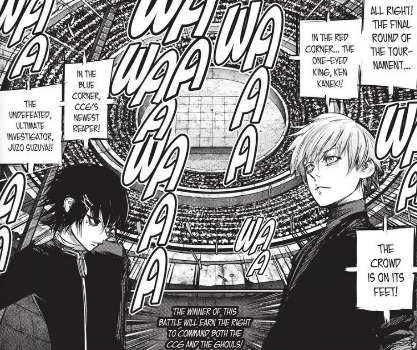
Gojo is a major character in the manga Jujutsu Kaisen, literally "Sorcery Fight" and he is the best sorcerer in the whole world. His entire identity revolves around being a sorcerer. Since he is so good and beloved at what he does, he thinks that everything is resolved by exorcising a curse or defeating a strong opponent. He has basically no identity outside of that. Which is why when he's fighting the possessed body of his student, a person he's been mentoring since childhood his priority is not to save Megumi but to beat a strong opponent. Gojo is a sorcerer, before a human being. That's who he is, that's who he always has been since day one.
I think part of the negative fan reaction comes from fans being really attached to this scene in the manga and deciding Gojo's entire character revolves around being a good mentor figure to children.

Which is just incorrect, Gojo's entire character revolves around being the strongest. On top of that though, Gojo can care about children and also care about being the strongest he can care about multiple things at once and have those things contradict each other because humans are complicated. I'd point out even in this panel where he's stating motivation he's not trying to raise these kids up into being healthy adults, he wants them to be strong Jujutsu Sorcerers. Even when he's raising kids, his intention is to turn them into Jujutsu Sorcerers because everything in Gojo's mind revolves around Jujutsu Sorcery. Gojo does not exist outside of the world of sorcerers. Gojo may be the chosen one but he'd never be able to hold down a job at Mcdonalds.
I think in general readers put more investment in the things characters say out loud, rather than their actions. You can say one thing and do another. I can say "I should never eat sweets again I'm going to improve my diet", and then go and eat ice cream five hours later. Gojo can state out loud his intention to foster children and protect their youths, but then fail to properly do that in the story. Characters are not always what they say they are, that's why they're interesting to interpret. This isn't me calling the readers stupid, just pointing out that Gojo is made up of contradictions. He wants to get rid of the old guard and replace them with something new, but Gojo IS THE OLD GUARD.
If the culling games arc has shown us one thing, it's that ancient sorcerers brought to the modern age do not care that much about human life on an individual level, they are all of them egoists. There's a reason Gojo resembles someone like Sukuna more than he does any other character in the manga. I'm not saying Gojo is exactly like Sukuna, he's far more altruistic and uses his genuinely noble ideals but at the same time Sukuna is a shadow archetype to Gojo he represents Gojo's flaws. The flaws that Gojo succumbs to in tragic fashion.
Which if you believe that Gojo genuinely does love his students, and the ideal he's fighting for is to raise up a better generation and allow them to live out their youths, then Gojo throughout the entire Sukuna fight is acting against those ideals. He cares far more about fighting Sukuna then he does saving Megumi, it's shown over and over again in the battle, Megumi is an afterthought to him. If Gojo care moredefeating the big bad and saving the world is more important than helping a child that Gojo is responsible for then Gojo is acting against his stated principles. Why should Gojo win the fight when he's fighting for all the wrong reasons?
Tragedies are like visual novels, if you make the wrong choice the novel will give you a red flag. If you ignore the red flag then you get locked into the route with the bad ending. Gojo always fights alone. Gojo only ever fights for himself, even if he's using that selfishness in support of a more noble ideal like creating a better generation of sorcerers. If Gojo consecutively makes the same changes then in a tragedy he's not going to be rewarded for it.
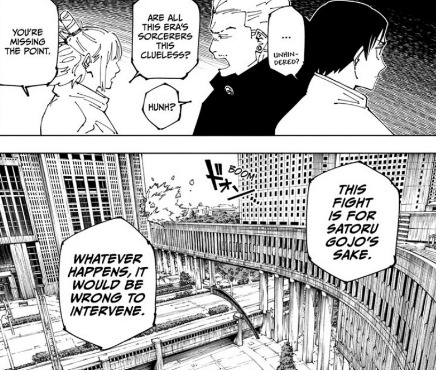
Gojo wants the old generation out and the new generation in, but Gojo resembles the old generation too much. Old sorcerers like Hajime and Sukuna respect him, Hajime argues that Gojo being able to fight for his pride is far more important than him living to the end of the battle when Yuta wanted to interfere and help him.
Gojo's death isn't a surprise curve ball that Gege is throwing us for shock value, it's a result of his choices throughout the manga. A manga about change, and the change between generations is not going to punish a character for remaining roughly the same. Of course you might find it disappointing that Gege didn't give Gojo the chance to grow and change and experience a character arc like Megumi or Yuji, but Jujutsu Kaisen is a tragedy, and the way Gojo's arc ended is consistent with what Gege wrote.

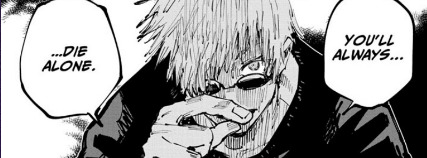
Jujutsu Kaisen is not just a tragedy though, it's a manga about death. The manga begins with Yuji's grandfather warning him not to die alone the way that he did. His grandfather's dying words are what motivate Yuji throughout the beginning of the manga as he's searching for a "proper" death.
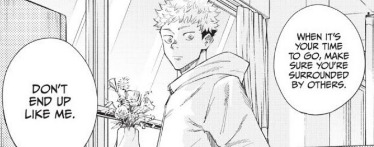
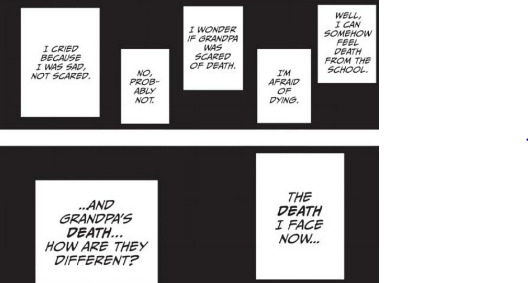

One of the major themes of Yuji's character is a contemplation of death. He accepts that death is inevitable, so he wants to save them from the gruesome deaths they'd experience if they became victims to curses and allow them to have a more satisfying death. Yuji's grandpa died an unsatisfying death because he died alone in a hospital room. Yuji even tries to make his own death a satisfying one because he believes by dying to seal away Sukuna he'll reduce the total number of casualties to curses.
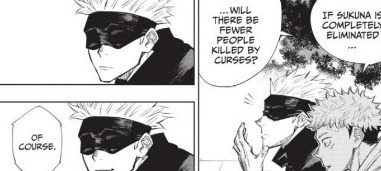
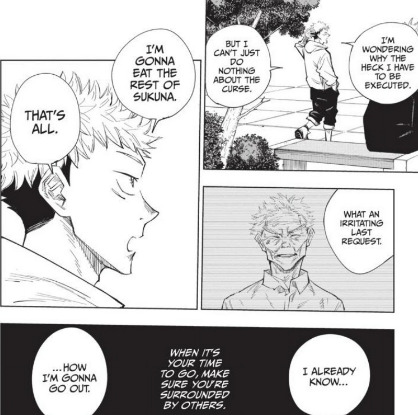
Jujutsu Kaisen keeps investigating the theme of death and what exactly would make for a satisfying death. At one point it's all but stated that death is the mirror that makes humans analyze their lives.
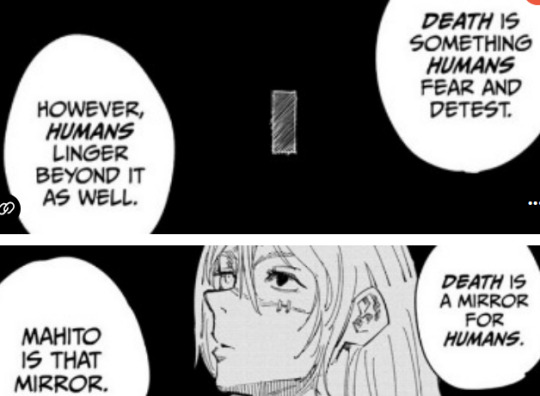
When Yuji fails to save Junpei from the "unnatural death" it calls into question whether or not his goal of saving people from unsatisfying deaths and the gruesome deaths caused by curses is even feasible. Nanami even says that Yuji might not be able to accomplish his goal and warns him away from the path.
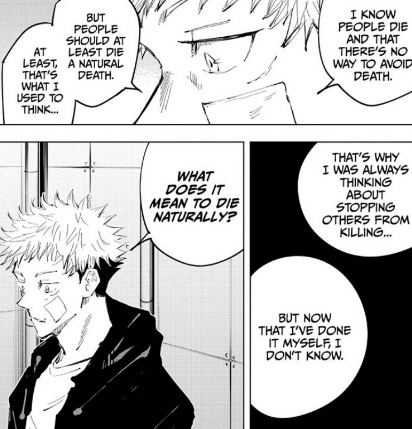
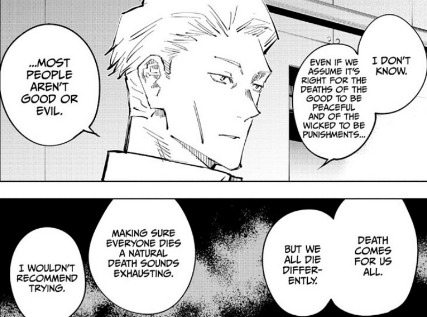
We see repeated unsatifying deaths in the manga, each time someone reflecting on their deaths that they weren't able to get what they wanted out of life. This list comes via @kaibutsushidousha by the way I'm quoting them.
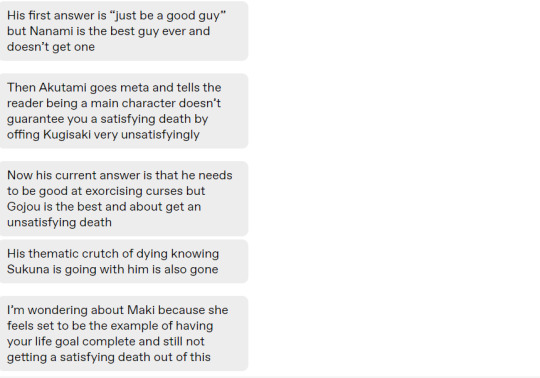
Nanami's a character who chose to work as a sorcerer because he didn't want to evade the responsibility of doing all you can to help people, he wanted to believe he's somewhere where he's needed. He never runs away from responsibility like Mei Mei does so he quite literally works himself to death, living and dying as a sorcerer. Nanami or Gojo's dying hallucination of Nanami even says as much, his death is the result of him choosing to go south and returning to be a sorcerer.
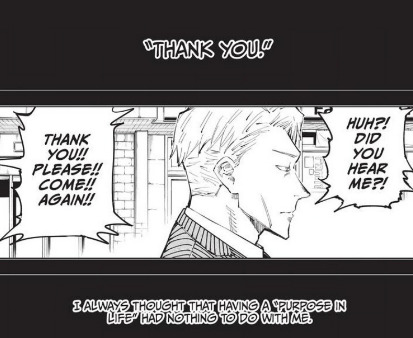
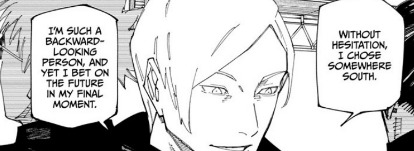
Maki chose revenge against the Zen'in over her sister, and as a result Mai is dead. Maki has all the power in the world now, her revenge complete but she's left with a sense of "now what?" She's as strong as Toji now but she failed to protect her sister, and it's the result of the choices she made. Maki's reflection isn't triumph, it's "I should have chosen to die with her."

Even Yuji himself is robbed of his narrative purpose. The manga began with Yuji saying he wants to choose how he's going to die and he'll die taking out Sukuna with him so he can reduce the number of people killed by curses in the world. Both of those things are thrown in Sukuna's face. Number one the amount of people Yuji can save by permanently killing Sukuna is now a moot point because he let Sukuna rampage in Shibuya.
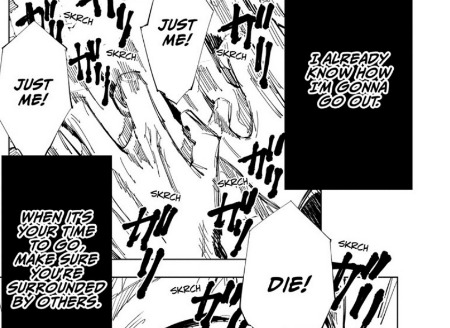
Number two, Sukuna isn't even in Yuji anymore. To build on what Comun said though, this repeated tragedy has a purpose to it and understanding requires understanding that Jujutsu Kaisen is an existentialist manga. Existentialism is basically a school of philosophy centered around the question of "Why do I exist?"
There's nothing about the invetability of death to make you question why you're alive in the first place. In the myth of Sispyhus, Albert Camus boils down all of philosophy to one question.
"There is but one truly serious philosophical problem, and that is suicide. Judging whether life is or is not worth living amounts to answering the fundamental question of philosophy. "
All of philosophy is should I shoot myself in the head or should I keep living? Everything comes after that question, which is why in Jujutsu Kaisen a lot of the characters motivations revolve around them contemplating death. Sorcerers exist in a world where they can die any moment, and as Gojo says most of them die alone. It might be the nature of sorcery itself that causes so many people to die, not only are they dying because they are trapped in an uncaring system, but the characters themselves aren't really attempting to live outside of it. They live and die as sorcerers, replaceable cogs in the machine.
All of these unsatisfying deaths may just be the result of all these characters making one choice, to live as sorcerers rather than people. Because to exist means to live in the world.
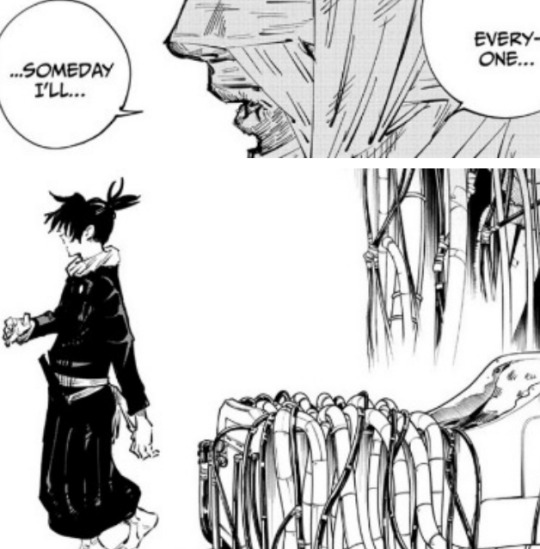

Even in Mechamaru's case, his goal is deeply existentialist by what I defined, all he wants to do is live in the world with everyone else rather than be stuck in his hospital room but his actions contradict that goal. Instead of letting his friends come and visit he's obsessed with the idea of getting a normal body because he feels that's the only way he can exist with everyone else, he makes a deal with the devil, he lies and goes behind their backs. He wasn't living with everyone else in the world and he could have chosen to, he chose wrong and his death is the result of that choice.

Jujutsu Sorcerers aren't living in the world. They're living in a little snowglobe far removed from the world with its own rules, most of them regressive and disconnected from the rest of society. If you define existentialism as just "living in the world' then a lot of these characters aren't, because they only exist in the world of sorcery.
INVISIBLE BUFFY: What are you talking ab-
SPIKE: The only reason you're here, is that you're not here. (drinking) INVISIBLE BUFFY: Right. Of course, as usual there's something wrong with Buffy. She came back all wrong. (moving around on the bed) You know, I didn't ask for this to happen to me.
SPIKE: Not too put off by it though, are you? (drinking) INVISIBLE BUFFY: No! Maybe because for the first time since ... I'm free. She tosses the sheet aside. Spike looks around, trying to figure out where she's going.
INVISIBLE BUFFY: Free of rules and reports ... free of this life.
SPIKE: Free of life? Got another name for that. Dead.
Not living in the world with everyone else is the same as being dead.
A lot of these characters either make the choice to act alone, or be a jujutsu sorcerer rather than a person and because of that they die as sorcerers, b/c sorcerers die that's what they do. Mai didn't want to keep living as a hindrance to Maki so she kills herself. Maki didn't want to be anything other than a sorcerer, so her little sister dies and she's not a big sister anymore. Nanami chose to leave his job behind and become a sorcerer again, he dies as one.
Of course I don't think the manga is punishing characters for being too egotistical, but rather too unbalanced. If anything Mai is too selfless and that is why she died, she didn't want to live for herself and chooses self sacrifice for her sister. An unbalance between selfishness or selflessness results in an underdeveloped ego. Jujutsu Kaisen doesn't punish individualism per se, moreso if you're not a fully developed individual you won't last long. Because it's also a manga about growing up in the world, and a person who doesn't have a healthy, mature, well-balanced sense of self is not a grown up.
This twitter user det_critics points out that Gojo (and also Yuki + Yuji's) failures in the manga can be attributed to the fact they don't have real senses of self.
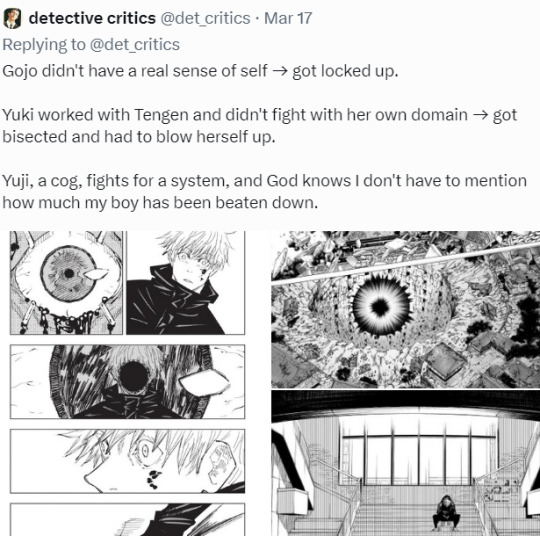
Gojo has an identity crisis as outlined by Geto, "are you Satoru Gojo because you're the strongest, or are you the strongest because you're Satoru Gojo?"
It's a challenge for him to find some reason to live outside of being the strongest, and in tragic fashion Gojo just doesn't find it in time. Gojo lived for fighting others, and proving to himself that he's the strongest, and that's how he dies.
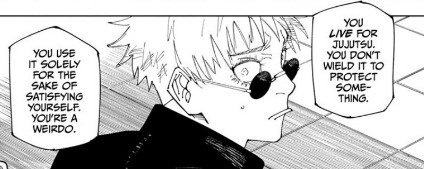
There's something I like to say about narrative punishment in stories. There are two ways to punish a character, you either don't give them what they want, or you give them exactly what they want. This is the latter, Gojo wanted to find someone stronger than him because deep down he believed that nobody could understand him unless they were on his level. He wanted to be surpassed, and that's why he focused on creating stronger young sorcerers, but he never shook himself of the belief that only someone as strong or even stronger than he was could ever be emotionally attached to him so he made a deliberate choice to draw a line between himself and others.
Gojo's essentially gotten what he wanted from that choice in the worst way possible. The student he picked to succeed him Megumi, has his body stolen and kills him. Gojo is surpassed, but it's not by one of his own students it's by an enemy that's not only trying to kill Gojo but is going to massacre his students afterwards.
Gojo's spent his entire life believing that because he's more powerful that makes him inherently different and above others, and being lonely because he himself believed he couldn't relate to ordinary people and he dies like an ordinary person, an unsatisfying death where he wasn't able to bring out Sukuna's best, where he gets unceremoniously cut in half offscreen but yay he's no longer the strongest. He's gotten exactly what he wanted. Megumi is still not saved, Sukuna's probably going to kill more people because Gojo failed to stop him here, but hey at least he stopped to compliment Gojo.
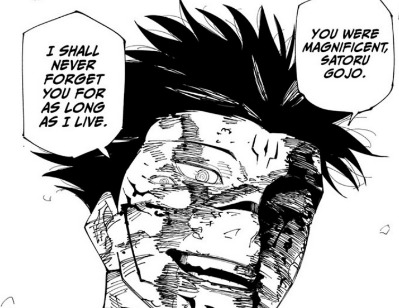
It's empty, but it's empty because of the choices Gojo made in life to just not bother connecting to people or develop any kind of identity besides being a sorcerer. Gojo lives and dies as a sorcerer, and his dying dream is returning to a teenager being surrounded by everyone he was with during his school days, because that's the happiest time in his life. Ironically he was happier before he became the strongest, because that was the only time in his life that he allowed himself to connect to people.
However in the eyes of others, he is someone who has it all. That's why he is always alone. There was no one who could hold the same sentiments and mutually understand him. Geto was the only one who could understand what he was trying to say, and the only one who could communicate well with him.
It's no coincidence Gojo and Geto die exactly a year apart on the same day, if anything I'd say the reasons they die are similiar to at least thematically. They both die because they don't want to live in the world. Geto thinks the world is too corrupt and GOjo doesn't want to be anything other than a sorcerer, both of them fail to adapt.
「 'It's just. . .'
It's just that it was what Geto had to do.
[...] To someone like him, the reality that the world of sorcerers presented to him was just too cruel.
'. . .that in a world like this, I couldn't truly be happy from the bottom of my heart.'」
They can't be happy in a world like this from the bottom of their hearts, so narratively they both die. The things they chose to live for at the end of their life they fail to accomplish, Gojo is no longer the stronget, Geto fails to wipe out mankind or make major changes to the world and they die as normal people unsatisfied because they weren't trying to live in the world and make connections to others. They die almost karmically a year apart because their main connection for both of them, the thing which made them feel connected to the world and other people was each other.
Which is why this panel breaks my heart and is so narratively satisfying because of how unsatisfying it is...
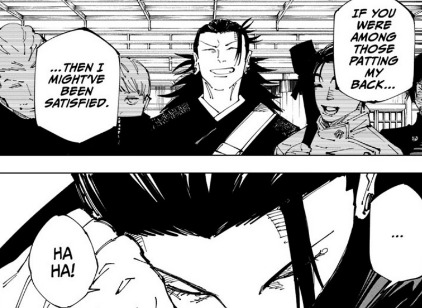
"If you were among those patting my back... then I might've been satisfied."
Gojo reflects that he's not satisfied dying against Sukuna, not because he failed to give him a good enough challenge but because Geto wasn't there to pat him on the back. The one thing that would have satisfied him he couldn't have, because he didn't live to connect to people he lived to be the strongest and he died alone as the strongest. There's just something deeply upsetting about Gojo's dying dream fantasy just him being there talking with all of his dead friends who he never appreciated or connected to properly when he was alive. Knowing that if something had just gone a little differently, that even if he had to die no matter what he could have died happier if Geto was among the people saying goodbye to him because that connection with Geto is what gave his life meaning.
Dazai Osamu: "A life with someone you can say good-bye to is a good life, especially when it hurts so much to say it to them. Am I wrong?"
-Bungou Stray Dogs Beast
#gojo satoru#jjk spoilers#jjk meta#jujutsu kaisen 236 spoilers#jjk 236#jujutsu kaisen 236#jjk 236 spoilers#jujutsu kaisen#jujustu kaisen meta#jujutsu kaisen theory#jujutsu kaisen manga#satoru gojo#geto suguru#suguru geto#satosugu
2K notes
·
View notes
Text
Point of View: the Biggest Thing You're Missing!
Point of view is one of the most important elements of narrative fiction, especially in our modern writing climate, but you rarely hear it seriously discussed unless you go to school for writing; rarely do help blogs or channels hit on it, and when they do, it's never as in-depth as it should be. This is my intro to POV: what you're probably missing out on right now and why it matters. There are three essential parts of POV that we'll discuss.
Person: This is the easiest part to understand and the part you probably know already. You can write in first person (I/me), second (You), and third person (He/she/they). You might hear people talk about how first person brings the reader closer to the central character, and third person keeps them further away, but this isn't true (and will be talked about in the third part of this post!) You can keep the reader at an intimate or alien distance to a character regardless of which person you write in. The only difference--and this is arguable--is that first person necessitates this intimacy where third person doesn't, but you still can create this intimacy in third person just as easily. In general, third person was the dominant (and really the only) tense until the late 19th century, and first person grew in popularity with the advent of modernism, and nowadays, many children's/YA/NA books are written in first person (though this of course doesn't mean you can't or shouldn't write those genres in the third person). Second person is the bastard child. Don't touch it, even if you think you're clever, for anything the length of a novel. Shorter experimental pieces can use it well, but for anything long, its sounds more like a gimmick than a genuine stylistic choice.
Viewpoint Character: This is a simple idea that's difficult in practice. Ask yourself who is telling your story. This is typically the main character, but it needn't be. Books like The Book Thief, The Great Gatsby, Rebecca, Dr. Jekyll and Mr. Hyde, and the Sherlock series are told from the perspective of a side character who isn't of chief importance to the narrative. Your viewpoint character is this side character, the character the reader is seeing the world through, so the main character has to be described through them. This isn't a super popular narrative choice because authors usually like to write from the perspective of their most interesting character, but if you think this choice could fit your story, go for it! You can also swap viewpoint characters throughout a story! A word of warning on that: only change your viewpoint character during a scene/chapter break. Switching mid-scene without alerting the reader (and even when you do alert the reader) will cause confusion. I guarantee it.
Means of Perception; or, the Camera: This part ties the first two together. If you've ever heard people talk about an omniscient, limited, etc. narrator, this is what they mean. This part also includes the level of intimacy the reader has with the viewpoint character: are we in their heads, reading their thoughts, or are we so far away that we can only see their actions? If your story is in a limited means of perception, you only have access to your character's head, eyes, and interpretations, where an omniscient narrator sees through all characters' heads at once. (This doesn't eliminate the viewpoint character--most of your writing will still be in that character's head, but you're allowed to reach into other characters' thoughts when needed. You could also be Virginia Woolf, who does fluidly move through everyone's perspectives without a solid viewpoint character, but I would advise against this unless you really are a master of the craft.) Older novels skew towards third person omniscient narration, where contemporary novels skew towards first person limited. You also have a spectrum of "distant" and "close." If omniscient and limited are a spectrum of where the camera can swivel to, distant and close is a spectrum of how much the camera can zoom in and out. Distant only has access to the physical realities of the world and can come off as cold, and close accesses your character's (or characters', if omniscient) thoughts.
Notice how I said narration. Your means of perception dramatically effects how your story can be told! Here's a scene from one of my stories rewritten in third-person distant omniscient. The scene is a high school football game:
“Sometimes,” he said. “Not much anymore.”
“It’s not better, then?” She shivered; the wind blew in.
“A little.” His tone lifted. “I don’t know if it’ll ever be better, though.”
She placed a hand on his arm, stuttered there, and slipped her arm around his waist. “Did it help to be on your own?”
He raised an eyebrow. “You were there.”
“Yes and no.”
“And the guys, the leaders.”
“Come on,” she heckled.
“Okay, okay.” Carmen sighed. “Yeah, it helped. I don’t think—I don’t know—I’d be me if they’d fixed it all.”
She grinned. “And who might you be?”
“Oh, you know. Scared, lonely.” He fired them haphazardly, and a bout of laughter possessed him which Piper mirrored. “Impatient.”
“And that’s a good thing?”
“No.” He sat straight. “Gosh, no. But I don’t want to be like him, either.” He pointed to the field; Devon recovered a fumbled ball. “He’s never been hurt in his life.”
She met his eyes, which he pulled away. “You don’t mean that," Piper said.
“Maybe not. He’s too confident, though.”
The cloth of Carmen's uniform caved and expanded under Piper's fingers.
With distant-omniscient, we only get the bare actions of the scene: the wind blows in, Piper shivers, the cloth rises and falls, Carmen points, etc. But you can tell there's some emotional and romantic tension in the scene, so let's highlight that with a first person limited close POV:
“Sometimes,” he said. “Not much anymore.”
“It’s not better, then?” Frost spread up from her legs and filled her as if she were perforated rock, froze and expanded against herself so that any motion would disturb a world far greater than her, would drop needles through the mind’s fabric. A misplaced word would shatter her, shatter him.
“A little.” His tone lifted. “I don’t know if it’ll ever be better, though.”
She placed a hand on his arm, thought better, and slipped her arm around his waist. “Did it help to be on your own?”
He raised an eyebrow. “You were there.”
“Yes and no.”
“And the guys, the leaders.”
“Come on,” she heckled.
“Okay, okay.” Carmen sighed. “Yeah, it helped. I don’t think—I don’t know—I’d be me if they’d fixed it all.”
She grinned. “And who might you be?”
“Oh, you know. Scared, lonely.” He fired them haphazardly, and a bout of laughter possessed him which Piper mirrored. “Impatient.”
“And that’s a good thing?”
“No.” He sat straight. “Gosh, no. But I don’t want to be like him, either.” He pointed to the field; Devon recovered a fumbled ball. “He’s never been hurt in his life.”
“You don’t mean that.” She spoke like a jaded mother, spoke with some level of implied authority, and reminded herself again to stop.
“Maybe not. He’s too confident, though.”
Piper felt the cloth of his waist cave and expand under her fingers and thought: is this not confidence?
Here, we get into Piper's thoughts and physical sensations: how the frost rises up her, and how this sensation of cold is really her body expressing her nervous fears; how she "thought better" and put her arm around his waist; her thought "is this not confidence?"; and how she reminds herself not to talk like a mother. Since I was writing from the close, limited perspective of a nervous high schooler, I wrote like one. If I was writing from the same perspective but with a child or an older person, I would write like them. If you're writing from those perspectives in distant narration, however, you don't need to write with those tones but with the authorial tone of "the narrator."
This is a lot of info, so let's synthesize this into easy bullet points to remember.
Limited vs. Omniscient. Are you stuck to one character's perspective per scene or many?
Close vs. Distant. Can you read your characters' thoughts or only their external worlds? Remember: if you can read your character's thoughts, you also need to write like you are that character experiencing the story. If child, write like child; if teen, write like teen; etc.
Here's another way to look at it!
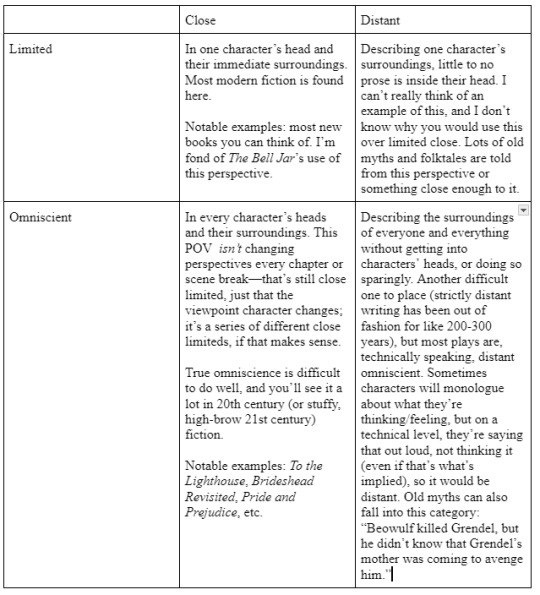
This is a confusing and complex topics, so if you have any questions, hit up my ask box, and I'll answer as best I can. The long and short of it is to understand which POV you're writing from and to ruthlessly stick to it. If you're writing in limited close, under no circumstances should you describe how a character other than your viewpoint character is feeling. Maintaining a solid POV is necessary to keeping the dream in the reader's head. Don't make them stumble by tripping up on POV!
#writeblr#writing#writing advice#fanfic#writers on tumblr#writing questions#creative writing#bookblr#writerscommunity#booklr
712 notes
·
View notes
Text
Someone needs to say it: The "Heaven is actually bad" plot line that Hazbin is based around is useless when you spend more then 2 minutes thinking about Vivzie's Hell and her characters.
Besides it being much too early for this idea, the revelation that Heaven or at least the beings running it aren't good people has little to no impact when the people who are being harmed by this are all horrible people. Stay with me here. None of these people are people who were unfairly brought into hell and we are never ever introduced to someone who was either. Why should we care that Heaven is "evil" and blocking redemption when all the sinners in hell we see are the worst of the worst who would have never gotten in even if it was fair.
For the "Heaven is bad" plot line to actually work, you need people who were just one sin away from Heaven, who would've gotten into Heaven if circumstance hadn't forced them down a path that stole it from them. You need characters who aren't comedic villains but land in the middle of morally grey. Those who deserved to be in Heaven but because Heaven refused to consider their circumstances, they were tossed to burn with people much worse than them. Those are the people who should be your main cast cause those are the people who would actually be impacted by Heaven being bad/ Heaven lying.
Angel dust, for all his trauma, was still part of the mafia and likely had killed people before (showing to almost take joy in it). Husk became an overlord and gambled souls, so he had to have had blood on his hands before hell. Alastor is a serial killer, and the list goes on and on. Sure, these characters are (somewhat) interesting, but they don't make for good characters to have when the key plot line is that Heaven is a scam. Even if that fact is true, none of them were ever going to get there in the first place and this is something we also se in every single background sinner shown in Hell too. They were never close to getting there, so why would they or we care that Heaven is bad when all sinners are shown to be horrific people who are at best in the dark grey area of morality.
If you look at it from the "angel's are unfairly killing sinners" route, it still doesn't work. If the angels are killing them, what makes it different then the sinner on sinner violence that hell is full off? Why is them dying by angels this bad thing when they are just as likely if not 10x times more likely to get knifed in the back by other sinners in hell the other 364 days, especially when everyone here apparently is just as horrible as the next person. You cannot condemn the angels for killing demons and then make a joke of out sinners killing each other and never show sinners who doesn't want to kill people. Life either matters or it doesn't and when the main cast doesn't even show a care for life (outside of Charlie's who's entire flaw is her naivety), why should the audience.
On top of that, Vivzie's whole overpopulation aspect and the Heaven plot line would connect better if she actually had people like those I mentioned above, people who stole to survive but got tossed out cause stealing is technically wrong, people who killed another to protect someone else but were still sent to hell because even though they saved that person's life that person wasn't supposed to be saved, people who passively engaged in sins but never really did anything harmful under them. This would add into how Hell is so overpopulated and highlight why its so important that Heaven is evil/ why Charlie's plan isn't just a naive pathetic fever dream.
In the end, Vivzie should have never made Heaven the central plot of this show nor tried to assign this blatant good vs evil to that conflict. Neither her characters nor her writing choices are able to respond to this conflict in a way that will end or even tell the story in a satisfactory manner.
#anti hazbin hotel#hazbin hotel critical#vivziepop critical#spindlehorse critical#spindlehorse criticism#also I am not just talking out my ass for this#I had/have this same problem in one of my original works#where I had to make the relationship between Heaven and God and cambion a lot more complex then just oh this side bad this side good#and thats what you have to do as a fucking writer is ask the hard question and be ready to scrap characters and ideas to answer them#When you deal with human characters nothing is black vs white and the minute you claim it is#you have failed
882 notes
·
View notes
Text
I can't now find where I mentioned it earlier but I wanted to expand on a thought about Black Sails as a tragedy. It's not so much about individual characters reaching particular endings. Rather, I think the central tragedy is that there is this fight - this war against the world, against civilization itself, which is the driver for everything Flint does and arguably the entire plot - that then doesn't take place. The story goes right up to the brink of this conflict, and by the end it's not just Flint raging alone against the world with whatever pirates can be persuaded to follow him, but it's Madi and the slave revolt and an entire people driven by what has been done to them and to their ancestors, it's something so much bigger than the individuals involved, with potentially world-changing consequences, history-changing consequences, an entire overturning of the colonising powers in the Americas.
And therein lies the tragedy, because we know the history, and we know that this story isn't just a Treasure Island prequel, it's interwoven with historical individuals as well and places itself in that context, and invites us to imagine what could have been while at the same time haunted by the spectre of how history actually plays out. The tragedy is that the war never happened. We know from the beginning that the war against civilization could never have been won in this story, but it still invites the imagining - what if, what if?
And so the audience is forced into the position of Silver, who is confronted with this vision of the future so ardently pursued and believed in by Madi and Flint, and cannot imagine it playing out. Silver, because he never believed in this fight to begin with and only knows that he will lose the ones he loves to it; us, because no matter how much we may believe in the cause, we know that they don't win, that there never was a slave uprising and pirate revolt that overturned the entire New World. Silver cannot bring that future about. All he can do is end the story.
Black Sails asks us to imagine, what if the treasure was not just a chest of gold, but an entire possible future that was killed and buried in the ground on a lost and forgotten island?
564 notes
·
View notes
Text
Batman Quest To Get A Birkin Bag
Ok so I have a very indulgent, SuperBats head fanfic that keeps me company on days that I forget to charge my earphones while walking my dog and to bore my wonderfully accommodating friends over dinner.
Long story short it’s a character study about Clark after his death. Doomsday kills him becuase we do not subscribe to Synder movies in this household.
Mostly its about Bruce grieving and reflecting on his ten+ year marriage with the man of steel with a large helping of the Justice League members bonding and finally getting to know Bruce and in turn Clark. (Kal never really got to say specifics about his life because Bruce wanted to keep his identity secret therefore a lot of Clark's life was private.)
For most of the fic Clark’s dead. But I'm one for angst with a happy ending so he comes back. How he comes back I have all kinds of versions but I just want to share this really silly one that I’m slightly obsessed with.
It’s about two years after Clark died. Currently, Bruce and Hal are off-world for a two-month mission. Shortly after they leave the League are battling some sorcerer who's in possession of a Jinn. During the battle two of the three wishes are used and at the end it's Flash who gets to use the last one.
He wishes for Clark to be revived back to life.
Jinn says he can't do that
Flash thinks of course just like in Aladdin you can't bring the dead back, make someone fall in love or wish for more wishes.
The Jinn is like how dare you think that's not within my power of course I can bring back the dead, I can't bring back Superman because Clark's not dead. he's just in his grave too weak to break out of his grave due to the lack of sunlight.
Flash hears this and immediately rushes over to dig up Kal.
The next month and a half are all about Clark adjusting to the changes over the last three years (Like having a new kid at the manor: Tim) Meeting new members (Green Arrow, Martian Man Hunter), and really bonding with his teammates ect.
While waiting for Bruce's return Clark asks Barry what he'd like.
Barry is confused
Clark clarifies that Barry was able to bring back one of Bruce's loved ones “to life.“ That’s never happened and for a man like Bruce who loves deeply for his family he going to be very grateful and he will not take “I’m just glad I could help” for an answer. So Barry needs to think of something or Batman will.
Barry doesn't know what to ask for but knows that Bruce is rich. He figures this would be a great time to get that designer bag that Iris always wanted but they could never justify ever buying. (Listen I don’t know if Iris is a designer girly but in this fic she really just likes this one bag.)
So Bruce and Hal get back and after the big celebration party, the JL held for Clark and Bruce's reunion. Bruce approaches Barry thanks him and asks if there’s anything he can do.
Thinking Barry is going to ask for a house, pull some strings with his Brucie persona so he can better his life at his job or status. Maybe ask for Bruce to fund or set up a wellness program for people in Central City.
But Barry is just like: Uh well Iris has always liked this bag.
And Bruce is thinking Really Barry You brought the love of my life back to life I’d move mountains (without Clark’s help) for you and you want some designer bag for your wife?
Bruce: Do you have a picture?
And as soon as Barry shows him the bag Bruce knows moving mountains would be so much easier.
The bag Barry wants to get is a Birkin Bag.
Now if you know anything about Birkin bags 1. they’re stupid expensive. 2. If you can afford one that doesn't mean you get to buy one. Hermes the company that makes them has this irate practice that you have to work up a good relationship with the store and the sales associates in said store to even get the privilege to buy a Birkin (usually by buying a ton of other Hermes products you don’t want.) Sometimes you buy half the store but if you’re not a high-profile client or they don't like your image they just brush you off and postpone your chance to ”buy” a Birkin. And if you do all of the above prerequisites You don't even get to pick the bag they "give" you one. Want a pink colorway? Sorry here's lime green you're welcome.
Now Barry has no knowledge of any of this and just thinks a Birkin is just some overpriced bag. The problem is Iris only likes this one colorway ( Size 35cm, Red Alligator Exterior, Gold hardware, Yellow Slik interior ect.)
This is going to be near impossible.
But In Bruce's mind, Flash did the impossible in bringing back Clark (Bruce thinks Clark was wished back to life because that's the story everyone is sticking to. Because the emotional trauma of letting Bruce know that Clark was alive the whole time rotting away in a grave for 2 years is not on anyone’s todo list.) So he will get this bag Even if it kills him. He's the goddamn Batman.
And all this lead up is to what I'm actually obsessed with
I just love the idea that Bruce is running around Brucie-ing it up to try to get in Hermes' good graces but his image of being a drunk playboy is activity stopping him from buying any bag.
He calls up the Daily Planet and starts setting up all these puff PR-boosting articles to up his image. Which starts rumors becuase Burce Wayne doesn’t do interviews so why now?
Gotham elite catches wind that Burcie Wayne wants a Birkin richest man in America can't get one. So they all start getting Birkins. They ware them to his galas, just to troll Burcie. The elite jump on the waitlist inflating the list to stupid long. Hermes starts to wear the exclusivity of Brucie Wayne as a sign of good taste and prestige.
Bruce searches the second-hand market and can't find the colorway Iris's wants.
Bruce goes undercover as a worker for a local Hermes store to become his own sales associate just so he can get around the prejudices of Bruce Wayne image and start racking up a sales history. (He just selling and buying to himself lol.)
So Bruce is playing a luxury salesman using his background of old money and Alfred’s butlering to woo potential buyers. Working his first retail job ever. Having to suck up to management so he can plead his case about Bruce Wayne. Using his access to get informed on what bags are currently available, who’s on the waitlist, where they rank, and criteria on how and what moves you up the list ect.
After months and becoming the number one salesman, he makes his case to allow Brucie Wayne to buy a bag.
It’s declined.
So he switches tactics.
He just makes a new cover as a recently won lottery winner looking to burn cash and wants to burn it with Hermes. And starts a new sale history. Using all of his knowledge and intel about what gets you on the waiting list.
He gets stonewalled a few times by former co-workers that he gets around by blackmailing them with gossip and infractions he witnessed or was told In confidence when he was a fellow sales associate.
Finally, his lottery winner persona is put on a waitlist. The only problem is he’s at the very bottom.
So what does he do?
He suties up As Batman and starts intimidating all those who are higher on the list than his lottery winner cover rocketing him up the list.
He hits a roadblock when he tries to scrace a woman on the list who doesn’t believe he’s actually Batman becuase “Why would Batman even want with a Birkin?”
Which leads to an escalation that gets him an earful from Superman who’s called to the scene by said woman whos terrified after Batman strings her upside down over the edge of her high-rise penthouse.
Clark offers to buy the bag becuase who wouldn’t want that kinda of PR endorsement?
Which Bruce vittamently refuses becuase it would cheapen the gift.
Finally, after a week of terrorizing wait-listers, his lottery winner persona is “given“ the opportunity to buy a bag.
But disaster strikes when that lucky break he thought he got because he was next on the list was actually bad luck becuase the person was bumped off becuase they bought the bag that Bruce had painfully calculated to purchase which was the only bag that would be made in the next 3 years that has the colorway that Iris wanted.
So Bruce tracks down and comforts the buyer in the dead of night as Batman. The buyer freaks out and says they didn't even want this colorway and really wanted a Caranery yellow ostrich skin colorway and if he could get her that one she'd trade for it.
This leads Bruce to play matchmaker for a series of buyers that have Birken Bags they don't love and would trade for their dream bag. And after months of fetch questing and matching sad Birken owners around the world with their dream bags Bruce he pulls it off. He finally gets a Canary, yellow ostrich skin colorway Birkin bag trades it for Iris’s dream bag. Only to find out it was ruined in a car crash that was caused by an alien invasion 2 months before that the JL had a particularly nasty time with and it was Bruce’s Batmobile that was thrown into her parked car.
The bag is a mess the zipper borken, missing hardware, leather scratched. But Bruce so done with everything accepts the trade and takes it back to the cave. Where he proceeds to 3D scan the bag then composite a CAD model and starts to collect all the raw components of the bag himself.
Getting only the best materials (much better than what Hermes was using) Talking to Killer Corc on how to find the best alligator pelts. Flying to India to personally pick out the red dye for the color. Mining the gold for the hardware from an asteroid that was threatening the Watchtower.
After he has everything Bruce proceeds to by hand construct an exact replica of Iris's dream bag. Essentially making the most over-budgeted fake to exist. Where he finally gives it to Barry (who has no inkling of the time and effort Bruce has put into this side project that has taken the better part of a whole year) who jokes in saying “Oh wow takes 12 months to run to the store huh?”
#Shit I'm never going to write#Fic Idea rambling#Silly Ideas#Superbat#The Flash#Batman#Superman#Burcie Wayne#bruce wayne#Messing Around#DCAU#Stupidly long#I'm great at parties ;)
349 notes
·
View notes
Text
One interesting thing that can happen in long running media is that the general cultural background can shift under the work, recontextualizing it as it is being written.
I'm specifically thinking of the Order of the Stick, a Dungeons and Dragons themed webcomic that started in 2003 with the titular party of adventurers going through a dungeon.
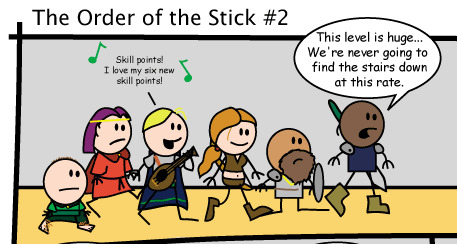
From left to right, we have Belkar Bitterleaf the halfling ranger, Vaarsuvius the Elf Wizard, Elan the Human Bard, Haley Starshine the Human Rogue, Durkon Thundershield the Dwarf Cleric, and Roy Greenhilt the Human Fighter.
The comic takes place in a fantasy setting that knowingly runs off the rules of Dungeons and Dragons third edition. Characters talk about rolls and bonuses and intentionally take levels in various classes. At the start, the comic was a pretty basic gag comic about the D&D rules, basic fantasy/adventure tropes, ect.
In the 20 years the comic has been running, it has updated about 1300 times, not counting bonus strips exclusively made for the printed version, and several print (or PDF) only side and prequel stories. It has also dramatically grown from it's roots, the art has improved while keeping the same general aesthetic, and the gag-a-day comic has become a sweeping fantasy epic. The characters have grown beyond their initial bits (Belkar is a Murderhobo, Elan is stupid, Haley is greedy, ect), and it's genuinely up there as one of my favorite stories.
But anyway, let's talk about Vaarsuvius. If you look at the above art, You'll notice that the characters tend to have three types of body shapes: Rectangles for Roy, Belkar, and Elan, feminine curves for Haley, and Robes for Vaarsuvius. This presentation is a pretty consistent signifier of gender and/or somebody wearing robes.
Early on, part of Vaarsuvius's running gag became their ambiguous gender. At the time, it was a fairly common joke in fantasy to talk about how Elven men had androgynous or "Girly" appearances, so V was part of that. Instead of a singular pronoun, characters would generally just abbreviate Vaarsuvius's name as "V", and whenever the narrative would have naturally provided some indication of gender one way or another, V would resolve the situation without providing any such indication. For example, an early gag has the characters seeking out a set of modern style bathrooms in the dungeon. When they find them, V says that their "More Efficient elven biology" means they don't have to go yet, so they wait outside while the boys go into the Men's room and Haley waits in the inevitable long line at the women's. When Vaarsuvius reveals that they are married, they use the term "Spouse" to refer to their partner, when we see their children, the children are clearly adopted (V and their partner both have pale skin, their children have darker skin) and refer to Vaarsuvius as "Parent". Vaarsuvius themselves seems to have trouble identifying other people by gender. Characters outside the central cast might refer to Vaarsuvius as "He" or "She", but doing so was always shedding light on that character's perspective, rather than saying anything about Vaarsuvius.
The assumption behind the gag is that Vaarsuvius must be either male or female, and the joke is that the narrative/Vaarsuvius themselves keeps finding ways to avoid "Revealing" their gender. Fan wikis and official books list Vaarsuvius's gender as "Ambigious" and on the forum there used to be a regular, multi-part thread dedicated to debatings Vaarsuvius's gender, even after the author declared that it would "never be revealed".
Anyway, going back to the start, it's 2023, and something shifted at some point, both in the comic and in the general cultural background. The jokes about V's gender kind of fell off, not just because the gag got played out, but because the basic assumption behind it simply doesn't work anymore. Everybody knows that Nonbinary people exist. There's no point in the comic where Vaarsuvius switches from being "Ambigiously Gendered" to Nonbinary, in fact, the entire comic reads just fine if you read Vaarsuvius as male or female and just not caring enough to clarify their gender to anybody and at some point other characters just stop thinking about it. But it's interesting to see how a character trait that was once included in even the most basic character descriptions (Varsuvius: Elven Wizard. Arrogant, Intelligent. Ambigiously gendered) just kind of got washed away by a rising tide of cultural nuance towards gender.
Also go read OOTS, it's pretty great.
#order of the stick#oots#webcomics#long running media#posts that have been swimming in my head until I let them out
403 notes
·
View notes
Text
I have a popular post about how I don’t enjoy it when love stories act like it would undermine the central romance if one or both of the protagonists had a positive experience with an ex or former sexual partner, and I just want to say: it’s really all about the framing.
It’s totally chill if a protagonist has never been in love before, for whatever reason. Maybe they have intimacy issues, or they were literally raised by wolves in the Canadian wilderness, or they’re too busy, or they were a child oblate, or they just never clicked with anyone that way, or they were married to a grotesquely evil Renaissance nobleman. If we’re supposed to be like “awww that’s nice, they are experiencing romantic love for the first time” or “I am so happy that something nice is happening to this girl after her experiences with the horrible duke,” that’s cool.
It’s also fine, in my book, if a protagonist has never had really good sex before. Not everyone has an easy time getting into it and, to be frank, not everyone has the good luck to encounter a considerate or generous lover immediately after becoming sexually active.
Here are some examples where I do think there are problems:
The historical romance author wants to establish that the hero is not a virgin, but she doesn’t want to make him a player and she doesn’t want to give him a bad ex as a source of angst and she doesn’t want him to have been in love before. So she gives him a long-term paid mistress. But, instead of going with “Adrian enjoyed Lily’s company and thought she was pretty/clever/pleasant, but obviously it was a business relationship on both sides,” you get something like “Adrian had never felt anything for Lily. She was merely a vessel for his manly needs.” And it’s like you knew this woman for years! Yet I have warmer feelings towards the friendly lady who works at the pharmacy! What’s wrong with you?
The Regency heroine was happily married to one dude, who died tragically young. She falls in love with her late husband’s best friend, also her friend, who has been in love with her since before the husband died but he never acted on it because it would have been wrong and hurtful to his friend. They both feel a little weird/guilty about getting together, but it’s clear that they aren’t actually disrespecting the late husband’s memory and he’d probably be happy for them if he knew. This is all good and fine, until the hero and heroine are making love and the heroine muses to herself that the hero is better in bed than her late husband. This honestly wouldn’t feel so sour if it had been established at the beginning that they never clicked sexually despite loving each other, but in that moment it feels like a cheap shot at a nice dead guy. And for what? So the audience has no doubt that the hero is the best sex man in the world?
Someone writes a fanfic where Character A has a non-endgame romance with Character C, when eventually Character A will end up with Character B. The A/C romance is obviously not going to last for well-established reasons, but it’s sweet and C is presented sympathetically. Until the author abruptly makes C a bitch in a non-canonical way when it’s time for them to break up, even though that’s far from the most natural way for the breakup to happen.
293 notes
·
View notes